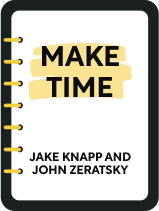

This article is an excerpt from the Shortform book guide to "Make Time" by Jake Knapp and John Zeratsky. Shortform has the world's best summaries and analyses of books you should be reading.
Like this article? Sign up for a free trial here .
Do you have trouble staying focused? How can you maintain focus?
According to Jake Knapp and John Zeratsky in Make Time, you need a daily “Focus” to keep yourself motivated to finish a task. You’ll work on this task or project for 60-90 minutes each day.
Learn how to maintain focus so you can complete your Focus.
Maintain Your Focus
Once you’ve selected a Focus for the day, the next step is learning how to maintain focus. If you need a deadline to get something done, Knapp and Zeratsky offer ideas for creating your own accountability. For example, tell a friend or family member what you’re hoping to accomplish and by when. Even if it’s only a self-imposed deadline, you’ll have linked it to the social pressure of someone else’s expectations. (Shortform note: Another benefit of deadlines is that they can help you avoid the trap of perfectionism. When a deadline is firm, you have to change your thinking from “this has to be perfect” to “this is good enough.”)
If the Focus you’ve chosen seems overwhelming, break it down into smaller chunks. When working with smaller increments of time, the authors suggest using a timer as a cue to keep your attention on your task. (Shortform note: This is known as the Pomodoro Technique, invented by Francesco Cirillo. Using a tomato-shaped kitchen timer—“pomodoro” is Italian for “tomato”—Cirillo would work for 25 minutes before stopping abruptly for a five-minute break. It’s been shown that a regular, brief break from work can help to maintain long-term attention.)
You can turn your daily Focus into a habit by associating it with some sort of cue. One particular trick that Knapp himself uses is to link a specific piece of music to your Focus. (Shortform note: Such a trigger is only the first step in making a pattern habitual. In The Power of Habit, journalist Charles Duhigg argues that to make a habit automatic, you need a cue to trigger it, a routine to follow, and a reward at the end. Taken together, these elements create a craving to repeat the new behavior.)
Be Mindful of Your Focus
Once you’ve chosen your Focus and worked out how to motivate yourself to maintain it, you need to watch out for inner urges that may pull your attention away. For example, if you often feel distracted by questions you would normally look up on the internet, keep a notebook to write those questions down and look up the answers later. Or if it’s not uncommon to feel your mind wander, the authors point out that a short meditation may help recenter yourself and bring your attention back where you want it.
If you start to feel bored or stuck on your Focus, don’t feel bad about it, but don’t give in to the temptation of distraction. Sometimes it’s better to wait out your mental blocks and keep your mind in the zone. (Shortform note: The authors cite studies that show that people subjected to boredom exhibit more creativity than subjects who feel relaxed or more engaged. One possible explanation is that boredom reminds us that the actions we take when we’re not bored have meaning. Boredom propels us into finding more rewarding uses for our time.)
When you feel too tired to tackle your Focus, even though you’ve set aside the time to do it, the authors suggest diving into it anyway. Sometimes merely starting to work on a project will spark creativity you didn’t know you had.

———End of Preview———
Like what you just read? Read the rest of the world's best book summary and analysis of Jake Knapp and John Zeratsky's "Make Time" at Shortform .
Here's what you'll find in our full Make Time summary :
- How the current landscape is designed to steal your time and attention
- How to be proactive to take back your time
- Why we were all better off as hunter-gatherers






